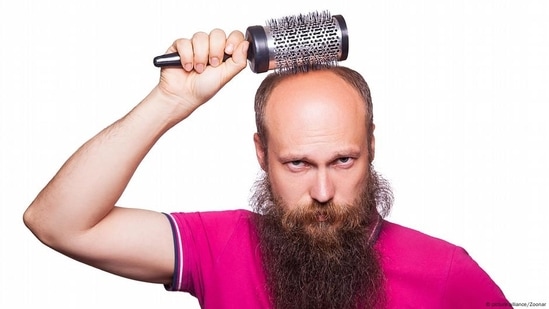
The bad reputation of balding: Is it worth reversing hair loss; know its causes and cures
9 months ago | 90 Views
Being bald has a bad reputation. Upon winning an Emmy in 1993 for his work on the US sitcom Seinfeld, comedian Larry David said: "This is, erm, all very well and good, but I'm still bald."
David has big lessons for bald men trying to compensate for their hair loss rather than embracing it. In 2000, David wrote an article for the New York Times Magazine titled: "Kiss my head."
"I'm a bald man who's out there. No toupees, no transplants, no hats, no beards… How could anyone have respect for bald men if we go to such ridiculous lengths? That's why hair guys are so condescending toward us," wrote David.
While 85% of men experience hair loss in their lifetime, hair loss isn't just a male thing — 33% of women experience some sort of hair loss or thinning.
But despite attempts from baldness advocates like David, many people seek out ways to restore hair growth. And now, there are more methods to do it than ever.
First, let's take a look at the causes of baldness.
Is baldness inherited from your mother?
Going bald is mostly related to your genes. Estimates vary, but about 60-70% of balding-risk is due to genetics.
The most common cause of hair loss is called hereditary-patterned baldness. The technical name for it is androgenetic alopecia, and it affects up to 50% of men and women.
There's a running joke that men inherit baldness from their mother, but it's only partly true.
It is true that baldness is strongly associated with one gene found on the X chromosome (the one you get from your mother) — it's called the AR gene.
However, baldness is polygenic, which means it involves many genes — around 200 genes, according to some estimates. Only a handful of those genes are inherited from the mother's side, and plenty from the father, so it's not entirely fair to blame your mother's genes. Research suggests more than 80% of people experiencing hair loss have or had a bald father.
Baldness is not guaranteed
Your genes don't determine your head's fate. It isn't certain you'll become bald even if all the males in your family sit around the dinner table looking like eggs in an eggbox. And there are plenty of bald men who have families with flowing locks of hair.
This comes down to environmental factors in our lives which affect hair loss, of which stress and nutrition have the biggest impact.
Stressful jobs and home lives, Alopecia areata, chemotherapy, nutritional deficits, or even hairstyles that pull the hair tight (like ponytails) can temporarily or permanently cause hair loss.
Hormones play their role, too. There is an idea that high testosterone levels cause baldness, but that is only partly true. It's more about specific hormones and their affect on hair: in particular, the sex hormone dihydrotestosterone (DHT), which is derived from testosterone. Hair loss is affected by how sensitive hair follicles are to DHT.
And it's not just men who experience hair loss due to hormones. Over 50% of women experience hair loss by the age of 80, most commonly due to a lifetime of hormonal changes during menopause, childbirth and pregnancy.
How to reverse hair loss
Business is booming for hair growth products. The total market size of hair loss treatment products was estimated to be $3.3 billion (€3 billion) in 2020. It's tipped to almost double by 2030.
There are several "hair restoration treatments" available for people losing their hair, as if going bald were a disease.
For one, hair transplant surgeries have become more common in recent decades. Hair transplant moves hair follicles you already have to fill in the balding area. Turkey has become a popular destination for many people seeking hair transplants and other cosmetic surgeries.
Then there are hair growth medications which need a prescription. One is Finasteride, which works as a DHT blocker to stop the hormone affecting hair follicles. And another is Minoxidil, which is a vasodilator, but how it promotes hair growth is not fully understood.
Lair hair therapy is also a regulatory-approved method of hair growth. Scientists aren't entirely clear how the therapy works, but daily low-level laser treatment for 6-12 months seems to increase hair follicle growth by increasing stem cell activity.
But scientists are beavering away to find yet more remedies for hair loss.
Sugar gel triggers hair regrowth
A study in mice was testing a naturally occurring sugar in humans and animals called 2-deoxy-D-ribose (2dDR) for its ability to assist wound healing when the researchers found 2dDR accelerated hair growth around the wound areas.
The researchers then tested the compound for hair growths and found a 21-day regime of applying the sugar as a gel caused rapid growth of hair follicles.
One caveat — it's only been tested in mice so far, so don't expect it to hit the shelves any time soon.
In the meantime, take stock in David's theory that bald men are better lovers. "There's the testosterone. We've got it in spades. That's why we went bald in the first place," he wrote all those years ago.
Read Also: Say goodbye to period rashes with coconut oil, says my mom





















